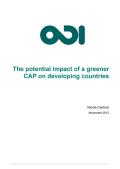In the light of the strong policy commitments at European level to the development of a sustainable and resource-efficient economy, in recent years Cedefop has been focusing on ‘green’ growth and its implications for skills and vocational education and training policies.
This report examines trends in employment, skill needs and training provision for a selected group of occupations likely to be affected by the development of a low-carbon and resource-efficient economy and makes policy recommendations that seek to ensure that businesses can take advantage of the opportunities presented by this transition and that the skill needs it generates are met.
Nine occupations were selected to provide a balanced mix of sectors and skill levels in the labour market:
(a) nanotechnologist, engineering technologist and environmental engineer as examples of high-skilled occupations;
(b) energy auditor, transport vehicle emissions inspector, insulation worker, electrician, solar photovoltaic installer and sheet-metal worker as examples of medium-skilled occupations;
(c) refuse/recycling collector as an example of a low-skilled occupation.

The future of renewable energy is fundamentally a choice, not a foregone conclusion given technology and economic trends, according to this report. It examines the future of renewable energy in the context of: total energy share by sector; integration between utilities, buildings, industry and transportation; business models and investment; urban planning; national and regional policy; and technology, cost and market growth. The report is based on the opinions of 170 leading experts and the projections of 50 recently published scenarios. It finds a wide range of expert projections of the share of renewable energy in the global energy mix by 2050, with low estimates below 20 per cent to high estimates upwards of 50-95 per cent. Experts predicted that the expansion of renewable will accelerate through 2020, particularly in leading developing countries such as Argentina, Chile, Colombia, Egypt, Ghana, Indonesia, Jordan, Kenya, Mexico, Nigeria, the Philippines, South Africa and Thailand.
This report includes case studies on market growth and policy support for the European Union, the United States, Japan, China and India.
This publication summarises the proceedings of a conference organised during April 2012 in Lisbon by the think tank Platform for Sustainable Growth (Plataforma para o Crescimento Sustentável) on the topic “How can we foster green growth?” Speakers included António Costa e Silva (CEO of Partex), Joy Kim (Advisor at United Nations Environmental Programme), Peter Vis (Chief of Cabinet of the EU Commissioner on Climate Action) and Carlos Pimenta (Coordinator of Sustainability at PCS). The aim of the event and the follow-up publication was to identify the role green economy can play to achieve sustainable growth in Europe in general and Portugal in particular.
The transition to a low-carbon, resource-efficient Europe is a key objective of the EU as set out in the Europe 2020 Strategy, related Roadmaps and other strategic documents. Some EU Member States have already started to take steps towards this transition with the adoption of supporting political decisions and implementation of related instruments. These efforts are welcome and should be further encouraged. However, there are also contradictory decisions being taken or delays that hinder or slow down progress. Overall, despite some positive steps in a number of policy areas, further efforts are needed to create stronger momentum towards a low-carbon, resource-efficient Europe. Consideration of resource efficiency related issues (including resource productivity, municipal waste management, environmental taxation, reform of environmentally harmful subsidies, water and air quality) within the European Semester process should also be strengthened.
